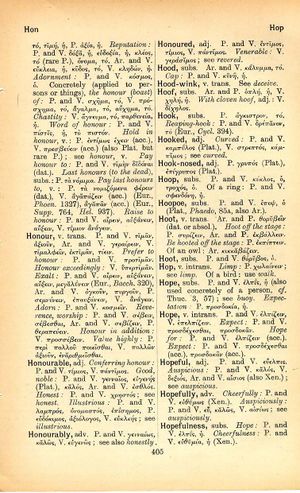honourable: Difference between revisions
From LSJ
ὁ ναύτης ὁ ἐν τῇ νηῒ μένων βούλεται τοὺς τέτταρας φίλους ἰδεῖν → the sailor staying on the ship wants to see his four friends
(CSV4) |
m (Woodhouse1 replacement) |
||
| Line 1: | Line 1: | ||
{{Woodhouse1 | {{Woodhouse1 | ||
|Text=[[File:woodhouse_405.jpg|thumb|link={{filepath:woodhouse_405.jpg}}]] | |Text=[[File:woodhouse_405.jpg|thumb|link={{filepath:woodhouse_405.jpg}}]] | ||
===adjective=== | |||
[[conferring honour]]: [[prose|P.]] and [[verse|V.]] [[τίμιος]], [[verse|V.]] [[πάντιμος]]. | |||
[[good]], [[noble]]: [[prose|P.]] and [[verse|V.]] [[γενναῖος]], [[εὐγενής]] ([[Plato]]), [[καλός]], [[Aristophanes|Ar.]] and [[verse|V.]] [[ἐσθλός]]. | |||
[[honest]]: [[prose|P.]] and [[verse|V.]] [[χρηστός]]; see [[honest]]. | |||
[[illustrious]]: [[prose|P.]] and [[verse|V.]] [[λαμπρός]], [[ὀνομαστός]], [[ἐπίσημος]], [[prose|P.]] [[εὐδόκιμος]], [[ἀξιόλογος]], [[verse|V.]] [[εὐκλεής]]; see [[illustrious]]. | |||
}} | }} | ||
Revision as of 08:53, 20 May 2020
English > Greek (Woodhouse)
adjective
conferring honour: P. and V. τίμιος, V. πάντιμος.
good, noble: P. and V. γενναῖος, εὐγενής (Plato), καλός, Ar. and V. ἐσθλός.
honest: P. and V. χρηστός; see honest.
illustrious: P. and V. λαμπρός, ὀνομαστός, ἐπίσημος, P. εὐδόκιμος, ἀξιόλογος, V. εὐκλεής; see illustrious.

